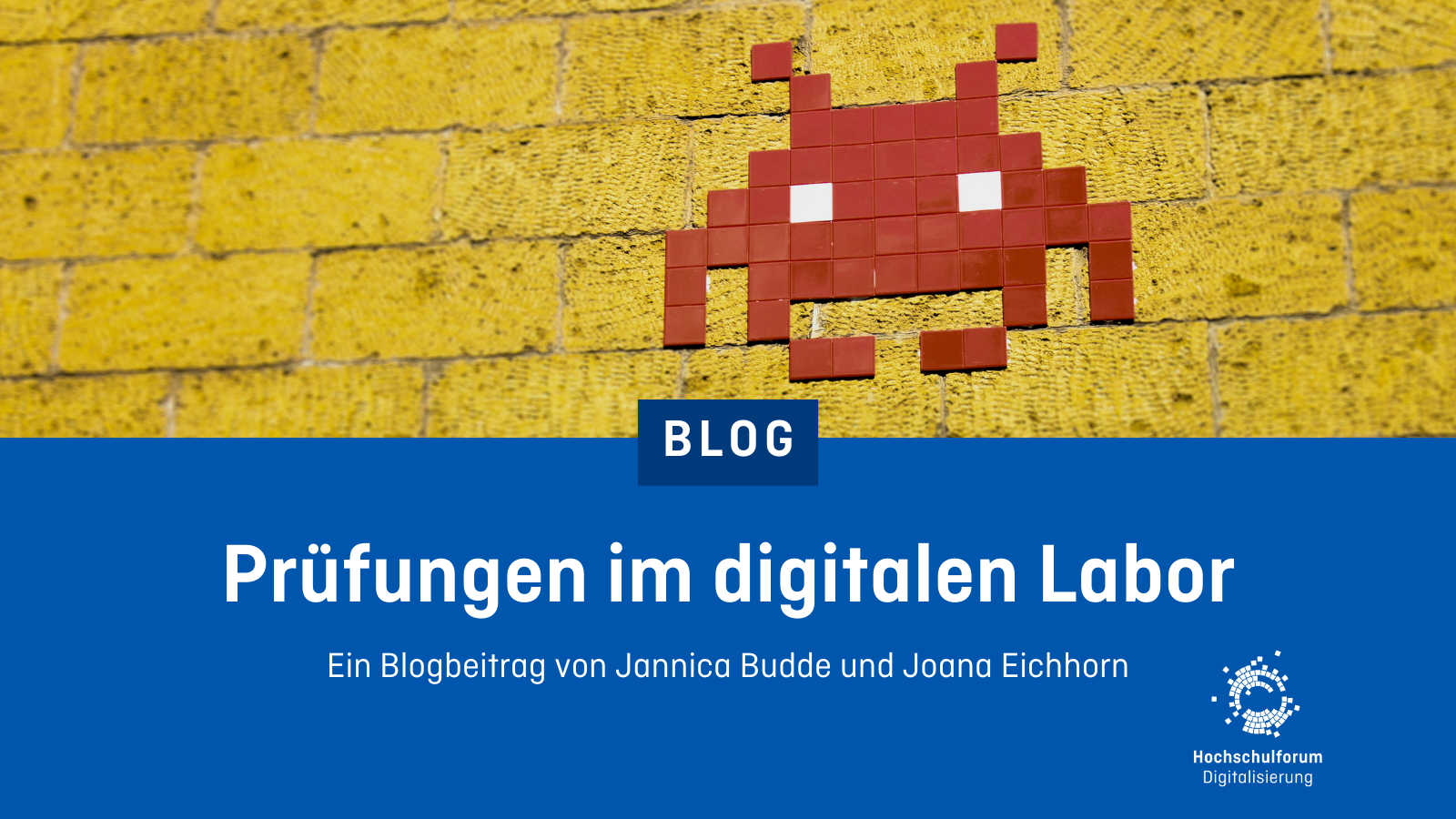Micro-credentials in Ireland: Lessons learned and recommendations for German Higher Education Institutions
Micro-credentials in Ireland: Lessons learned and recommendations for German Higher Education Institutions
03.04.25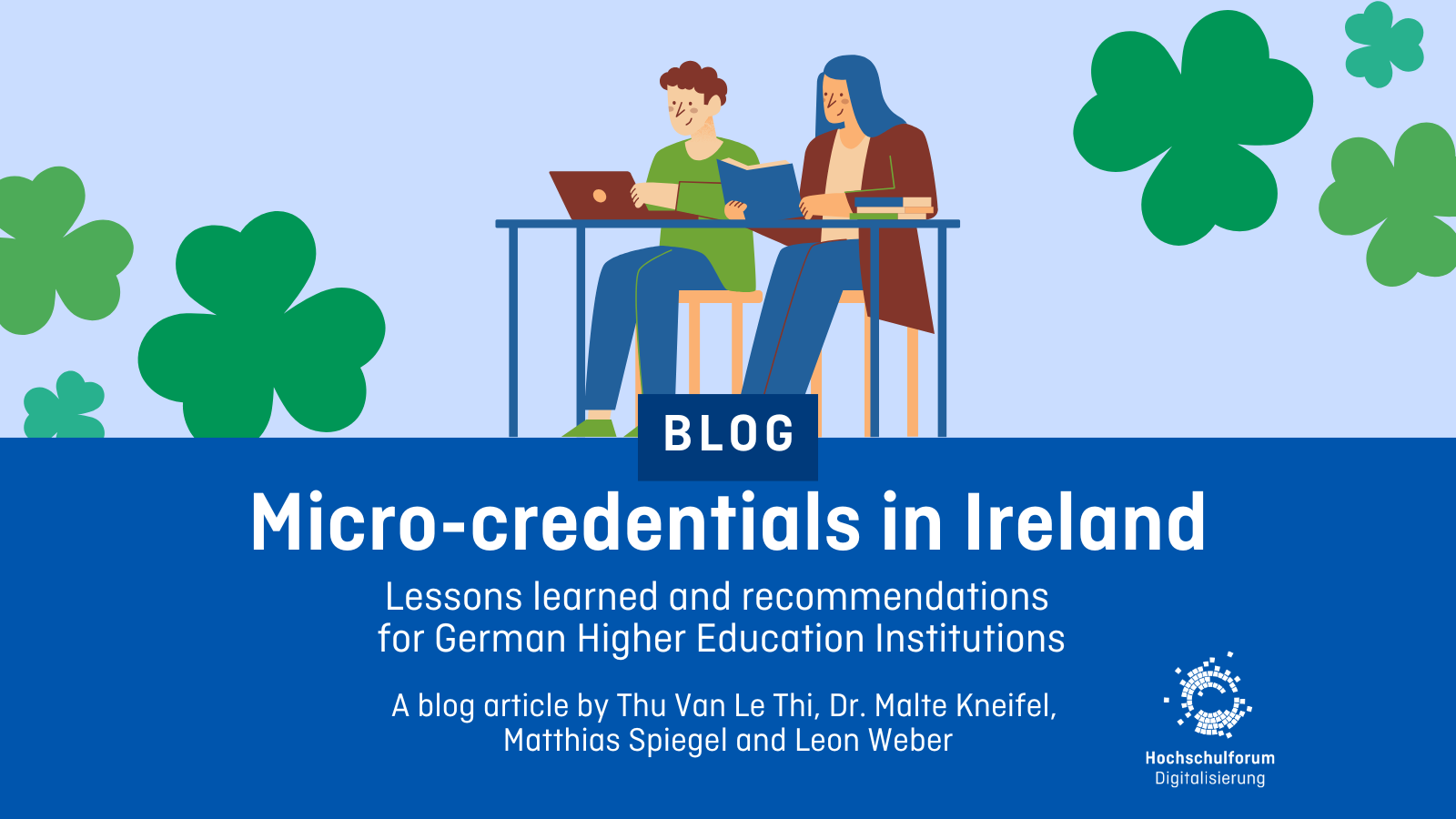
In Ireland, the project MicroCreds provides a framework for distributing and establishing micro-credentials. Earlier this year, a delegation sponsored by Hochschulforum Digitalisierung visited three universities in Dublin and one in Waterford to learn more about their system and how standards for using micro-credentials could be established in Germany. This blog post showcases the insights gained during the delegation trip to Ireland on the topic of micro-credentials in January 2025, funded by HFD.
Background of the Delegation Trip
Micro-credentials serve as proof of learning outcomes, often in the form of specific skill acquisition, on a compact scale (hence “micro“). These credentials are typically implemented digitally, such as through badges or electronic certificates. For higher education, micro-credentials (and the preparatory learning opportunities leading to them) have significant potential to address specific competency needs, engage diverse learner groups, and promote individual educational paths.
In Germany, the introduction of micro-credentials in higher education is still proceeding slowly. In contrast, Ireland has successfully implemented micro-credentials for years. This was achieved through MicroCreds, a nationally funded project led by the Irish Universities Association. Our motivation for this trip was to engage with representatives from MicroCreds and participating universities on-site to learn how the implementation of micro-credentials –including legal, organizational, and technical standardization – can succeed on a national level and in the higher education context.
The delegation trip took place from January 27–29, 2025. We visited three institutions in Dublin that are involved in the MicroCreds project and one institution in Waterford that offers micro-credentials outside the MicroCreds initiative.
We visited the following institutions and engaged in discussions with colleagues on-site:
- Irish Universities Association (IUA, Dublin)
- University College Dublin (UCD, Dublin)
- Dublin City University (DCU, Dublin)
- South East Technological University (SETU, Waterford)
Impressions of the delegation trip to Dublin
1. Key Questions and Objectives
Our delegation trip aimed to gain insights by identifying best practices related to the establishment of a national standard and system for micro-credentials. Additionally, we sought to make these insights applicable to the German higher education context by formulating actionable recommendations to promote the adoption of micro-credentials in Germany.
To achieve this, we developed a set of key questions for our discussions in Ireland, covering a broad spectrum of topics: political and strategic aspects, technical considerations, the practical implementation of micro-credentials (and related learning opportunities) at universities, as well as cooperation with relevant stakeholders.
Political and strategic aspects
- Which framework conditions have been set through Irish policy to establish Micro-credentials nationwide at Irish universities?
Technical aspects
- How are digital credentials issued in Ireland?
- Which platform is used?
- How does this work technically?
Implementation at higher education institutions
- What is the ECTS size of micro-credentials?
- What is the status of external participants?
- How are micro-credentials accredited and quality assured?
- Recognition (Anerkennung) and crediting for curricula (Anrechnung): To what extent
- is this possible for micro-credentials?
International aspects
- To what extent are the micro-credentials sharable and stackable (on an international level) in line with the EU council recommendation and the requirements formulated therein?
- Which status do students of partner universities and alliances have?
Cooperation with relevant stakeholders
- Which structures and mechanisms of communication and collaboration with stakeholders exist (especially learners, teachers, and representatives from industry and business)?
- Which (potential) problems have arisen, and how were they confronted and solved?
Insights from the Delegation Trip
Through our discussions with Irish partners, we gained a wealth of valuable information, insights, and recommendations across various aspects of micro-credential implementation. This section summarises these findings in relation to our key questions and objectives. We will first address the project MicroCreds and then continue with the implementation of micro-credentials at the Irish universities.
The Role of the MicroCreds Project
The MicroCreds project was initiated by the Irish Universities Association under the Human Capital Initiative (HCI) of the Irish Higher Education Authority (HEA). The HCI is a five-year funding program with a total budget of €300 million, aimed at promoting “skills-focused programmes” in higher education to meet labour market needs.
MicroCreds has a funding volume of €12.3 million over five years (2020-2025) and aims to establish micro-credentials as a format for lifelong learning in Ireland. Key initiatives include the creation of a national framework for quality-assured and accredited micro-credentials and the development of the microcreds.ie portal, which centrally promotes micro-credentials offered by the IUA member universities.
The National Micro-Credential Framework
One of the most interesting aspects of our delegation trip was the national framework for micro-credentials developed by MicroCreds. This framework, created with input from all IUA member universities, was described as a challenging but rewarding process. Although referred to as a national framework, it is binding only for IUA members. Other Irish universities, such as SETU, are not required to follow it. Nevertheless, the framework is comprehensive: it takes up the definition of micro-credentials according to the Council Recommendation on a European Approach to micro-credentials for Lifelong Learning and Employability (2022/C 243/02), determines the size of micro-credentials measured in ECTS, defines the levels of the Irish national qualifications framework between which micro-credentials may range, and outlines their stackability, i. e. the possibility of combining several micro-credentials in order to acquire a more comprehensive proof of competence.
Basic definition and rule for microcredentials from the MicroCreds National Framework
| Definition | Orientation towards the Council Recommendation on a European approach to Micro-credentials for lifelong learning and employability (2022/C 243/02), however: Work definition of micro-credentials as “small, focused courses” in digital, hybrid or physical presence format. |
| Scope | 1-30 ECTS, usually one micro-credential amounts to 5 ECTS credits |
| Levels | Levels 8 and 9 of the Irish National Framework of Qualifications (equivalent to Bachelor’s and Master’s degree) |
| Quality Assurance | The responsibility for developing quality assurance systems for their micro-credentials lies with the higher education institutions. |
| Stackability | Stacking of micro-credentials is possible, is only implemented based on thematically relevant learning pathways developed by higher education institutions. Stacking of micro-credentials for a university degree (Bachelor, Master) is currently not (yet) possible. The same applies to the stacking of micro-credentials between higher education institutions. |
On microcreds.ie
Microcredentials.ie functions as a “shop window” through which the courses offered by the universities that lead to the micro-credentials are centrally registered and advertised. In addition to a description of the content, the mode (in physical presence, hybrid or online), duration, start date, registration deadline, NFQ level, ECTS, fee and subsidised fee are specified for each learning offer. Learning objectives, participation requirements and contact information at the university are also made available. The issuance of the micro-credentials is managed by the higher education institutions which implement their own technical solutions for this purpose (see the following section for more details).
The main target group of MicroCreds’ micro-credentials are professionals who are interested in further training. However, students and interested members of society also have the opportunity to participate. One of MicroCreds’ declared aims is to establish the micro-credentials offered by universities as a brand (compared to other commercial training providers). Accordingly, the importance of marketing and communication measures was also emphasized.
Another point worth mentioning is “MicroCreds Innovate”, a project component in which the interests of industry and business are considered and needs analyses for micro-credentials are carried out. For the Irish context, the greatest need was identified in the area of “transversal skills”, followed by biomedicine, AI and the food industry.
Recommendations for the German Higher Education Context
The insights from our delegation trip can be transferred to the German higher education context for the establishment of micro-credentials, although certain limitations apply. Below, we outline concrete recommendations based on the key questions formulated before the trip.
Political and Strategic Aspects
The introduction of micro-credentials in Ireland was favoured and legitimised from the outset by political interest and the involvement of numerous stakeholders in the Irish higher education sector.
Based on this, the following recommendations can be formulated for the German higher education context with regard to a) the implementation of political framework conditions for a national micro-credential standard and b) strategy development at and between higher education institutions, with the involvement of political stakeholders:
- Higher education institutions should proactively motivate policymakers by presenting concrete proposals, such as a micro-credential framework.
- The framework should define micro-credentials with regard of their purpose, their size, their location in national qualification frameworks, their quality assurance as well as their stackability, recognizability and creditability.
- The framework should align with existing international standards and national qualification frameworks (e. g. the European Approach to micro-credentials, the ECTS system, national and European qualification frameworks, etc.).
- The framework should be designed in a way that grants the higher education institutions leeway to design the learning experiences leading up to micro-credentials.
- Universities must always feel included in the development process. This requires dedicated communication efforts, for which resources need to be allocated.
- The framework should not be static but regularly checked and adapted by the higher education institutions.
- In the German higher education context, orientation towards the “Irish model” is not possible without further adjustments due to educational federalism. One solution may be calls for proposals by funders operating on a national level (e. g. Hochschulforum Digitalisierung, Hochschulrektorenkonferenz) or the Federal Ministry of Education and Research for joint projects.
- Communication and mediation must take place between the higher education institutions involved. If there is no cooperation, competitive thoughts must be overcome. This can be promoted by political actors, e. g. ministries.
Technical Aspects
Where the responsibility for the development of a technical infrastructure for the digital exhibition, storage and sharing of micro-credentials is located depends on the demands placed on the micro-credentials.
- It can be helpful to establish a central point of contact within a higher education institution or alliance as the legal entity responsible for issuing digital micro-credentials.
- The scale of micro-credentials is related, among other things, to the process of issuing them. It is therefore recommended to automate these processes as quickly as possible in order to increase their scale.
Implementation at Universities
Learners’ status
The enrolment of micro-credential participants as regular students works in Ireland but involves administrative expenditure. In Germany, such enrolment is still unclear with regard to the legal situation.
Recognition and crediting
Accreditation
Quality Assurance
- It is advisable to link the extent of the quality assurance processes to the size of the micro-credentials. Particular attention should also be paid to the quality assurance of the assessments that lead to the issuance of micro-credentials.
Stackability of micro-credentials
Didactic Design
Designing, implementing and administrating the learning experiences that lead to micro-credentials is resource intensive. It is advisable to set up specialized teams for this purpose and not design these tasks as add-ons for employees. For this, appropriate resources must be planned.
Cooperation with stakeholders
Regarding the question of structures and mechanisms for the communication and cooperation with stakeholders and the related challenges, our partners gave us the following advice:
The target groups of micro-credentials (potential learners as well as representatives from industry and business) still have only little understanding of what micro-credentials are and how they benefit them. When micro-credentials are newly introduced, the number of interested learners will initially be low. This must be “endured” because the demand will increase parallelly to the ongoing implementation of micro-credentials. For this, however, a robust communication strategy is needed, for which corresponding resources need to be allocated.
Stakeholders from industry & business
Due to their strict orientation towards labour market demands, our Irish partners attached great importance to the involvement of stakeholders from industry and business in the development of their micro-credentials. Special communication structures were created for this purpose.
For the German higher education context, it should be discussed whether the introduction of micro-credentials should also be primarily oriented towards labour market needs, or whether it should serve other goals. This question should be answered jointly and unanimously by as many higher education institutions as possible in order to subsequently create communication structures with the relevant stakeholders.
On involved higher education institutions and alliances
Developing the national framework for micro-credentials in Ireland was a major feat, as the various stakeholders had to find a common approach. The IUA project team therefore needed diplomatic skills and ongoing communication.
On April 9, the members of the delegation will present their findings in a digital hangout and discuss the extent to which the Irish model can be applied to the German higher education sector:
Hangout: Micro-credentials in Ireland – A Model for German Universities?
References
Quality and Qualifications Ireland (2021): National Framework of Qualifications.
Government of Ireland / Higher Education Authority (HEA) (o. J.). What is the Human Capital Initiative (HCI)?
Microcreds (2025). „Portal microcreds.ie“.
Progress Consult Ltd. (2025). EBSN Professional Development Series for Basic Skills Teachers.
Council of the European Union (2022). „Council Recommendation of 16 June 2022 on a European approach to Microcredentials for lifelong learning and employability“, in: Journal of the European Union 2022/C 243/02.
ABC to VLE Project (o. J.). ABC Learning Design.
Authors
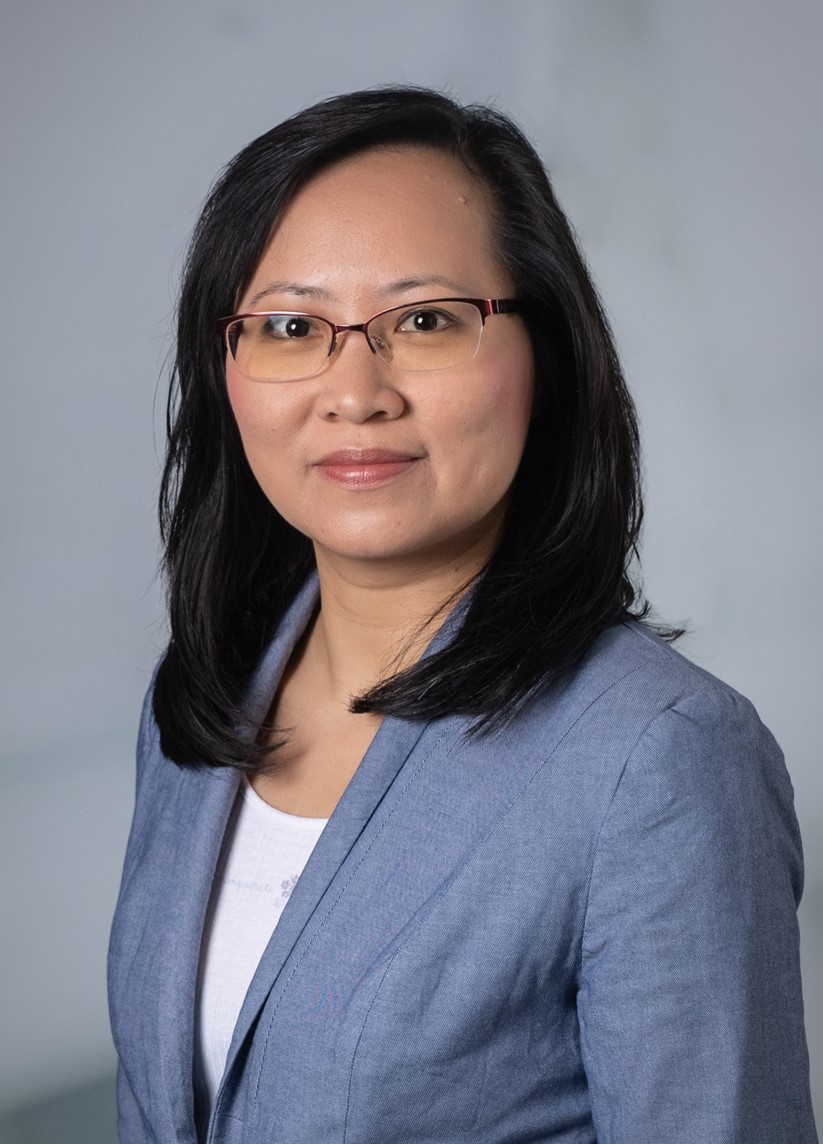
Thu Van Le Thi is a member of the Central Teaching and Skills Development Unit at Nuremberg Institute of Technology. She designs and implements micro-credentials, including the MC4Data programme for data analytics in close cooperation with companies. She is also responsible for the Future Skills approach to promoting students’ future skills, which was awarded the German Employer Award 2024. Her focus is on practical, flexible learning opportunities for students as well as skills development and lifelong learning.

Malte Kneifel received his doctorate from Johannes Gutenberg University Mainz and currently works at the Vice-Rectorate for Teaching and Studies at the University of Cologne. There, he develops project- and topic-related digital learning experiences and is involved in strategy processes on the topics of learning experience design and micro-credentials. Previously, he worked as a research assistant in the field of Romance linguistics in teaching and research.

Matthias Spiegel has been working at Nuremberg Institute of Technology since 2022 and supports the Faculty of Computer Science in the development of infrastructure and teaching. Matthias was responsible for the technical implementation of the digitally verifiable certificates issued in the MC4Data programme.

Leon Weber is a member of the Staff Unit for University and Quality Development at the University of Rostock, where he is responsible for the development and quality assurance of international study programmes offered by the European University Alliance EU-CONEXUS. He is also working on the introduction of micro-credentials at the University of Rostock.





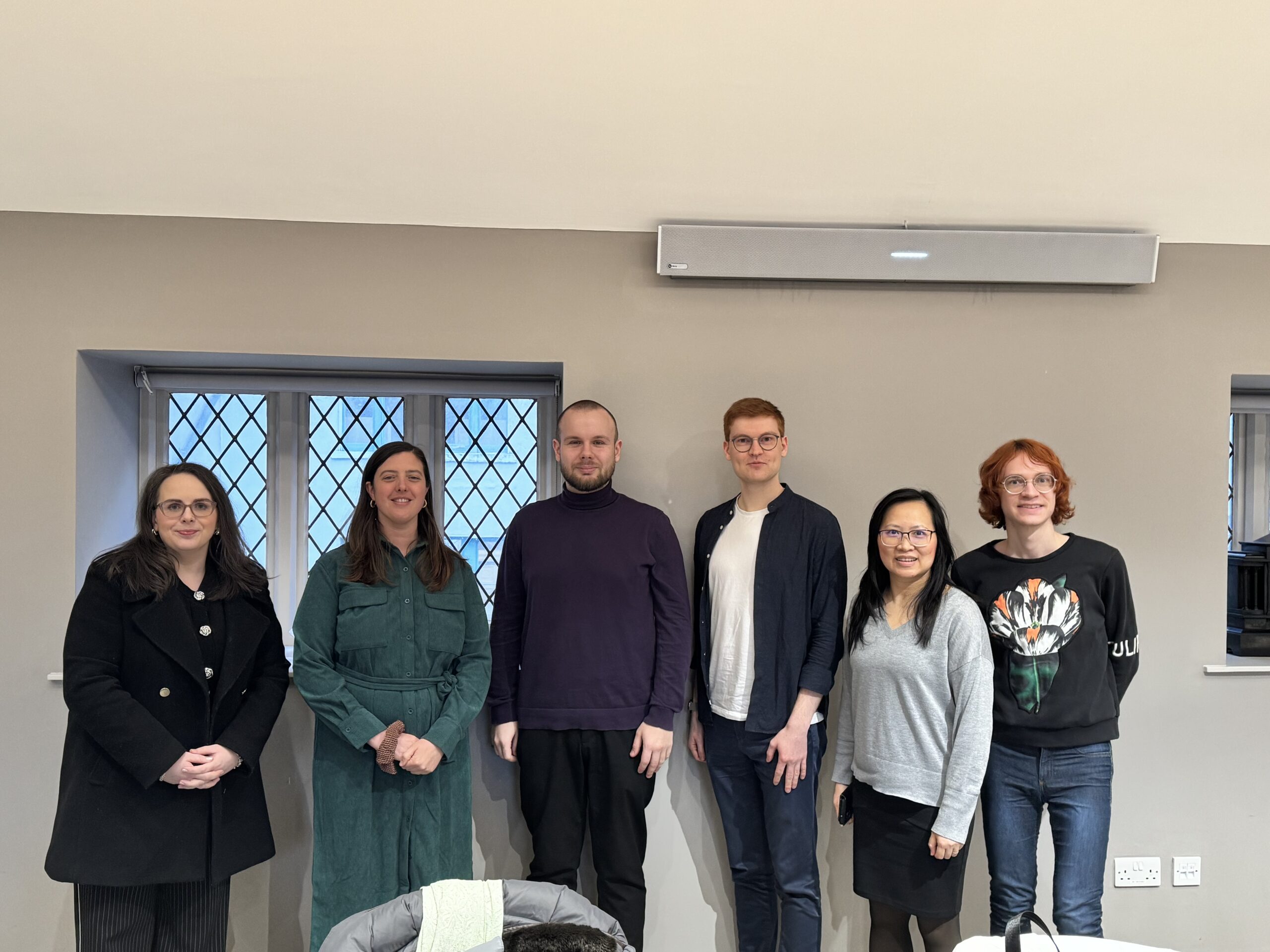
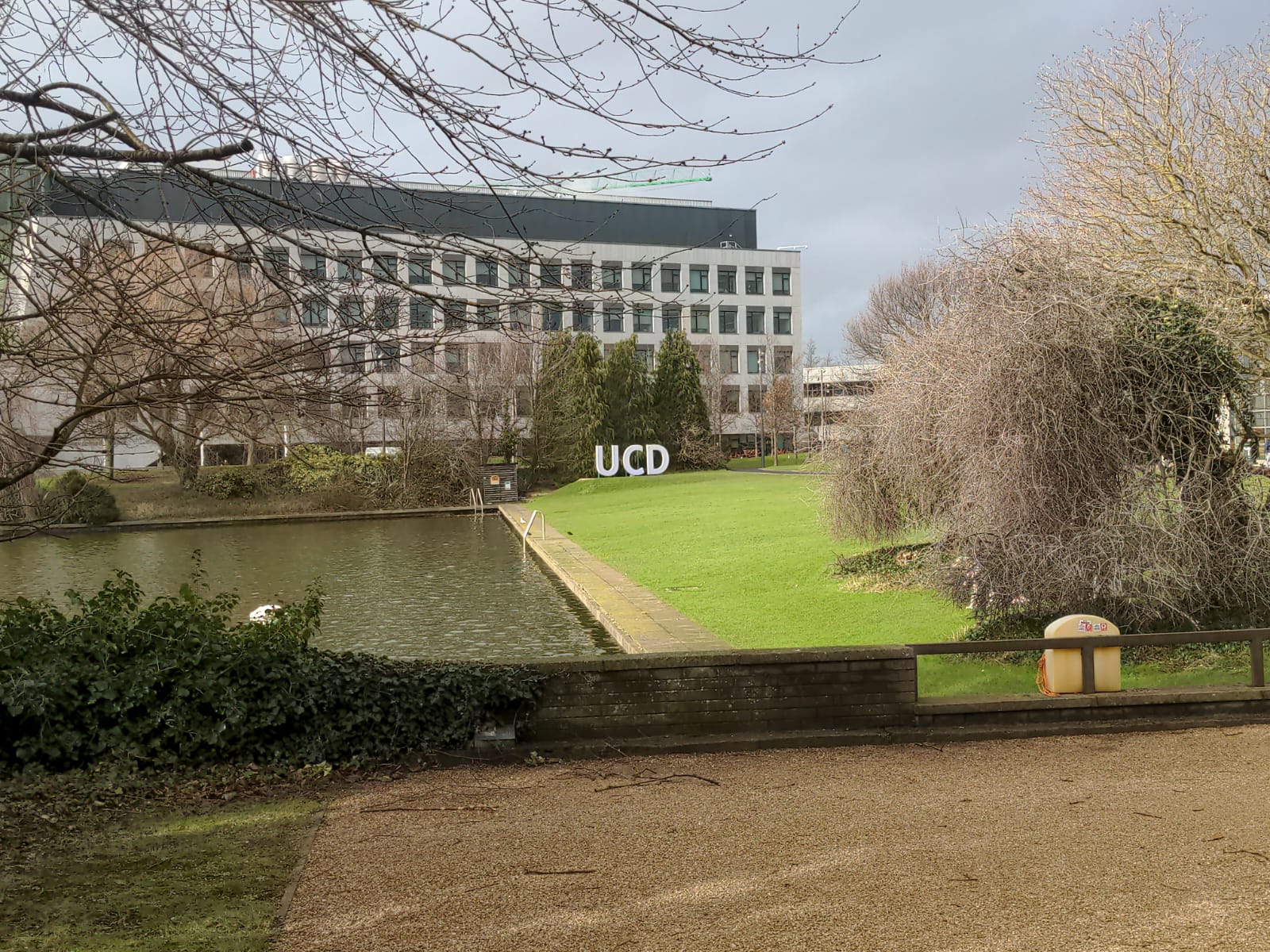






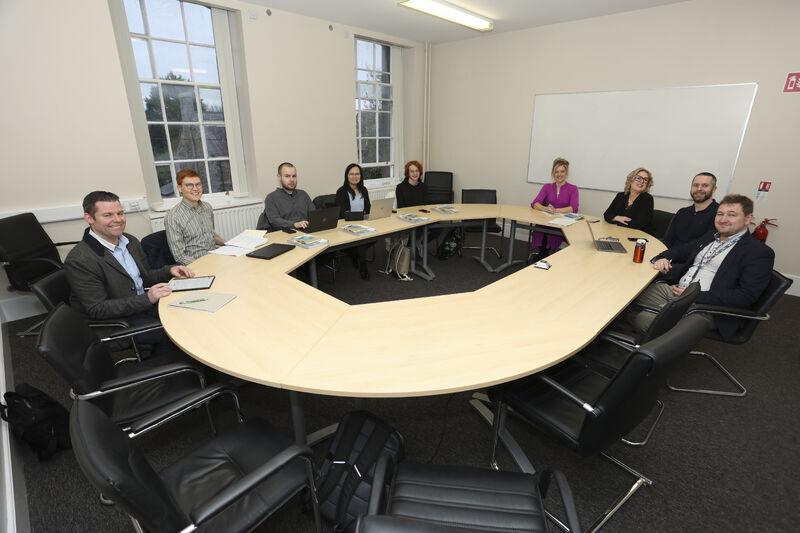



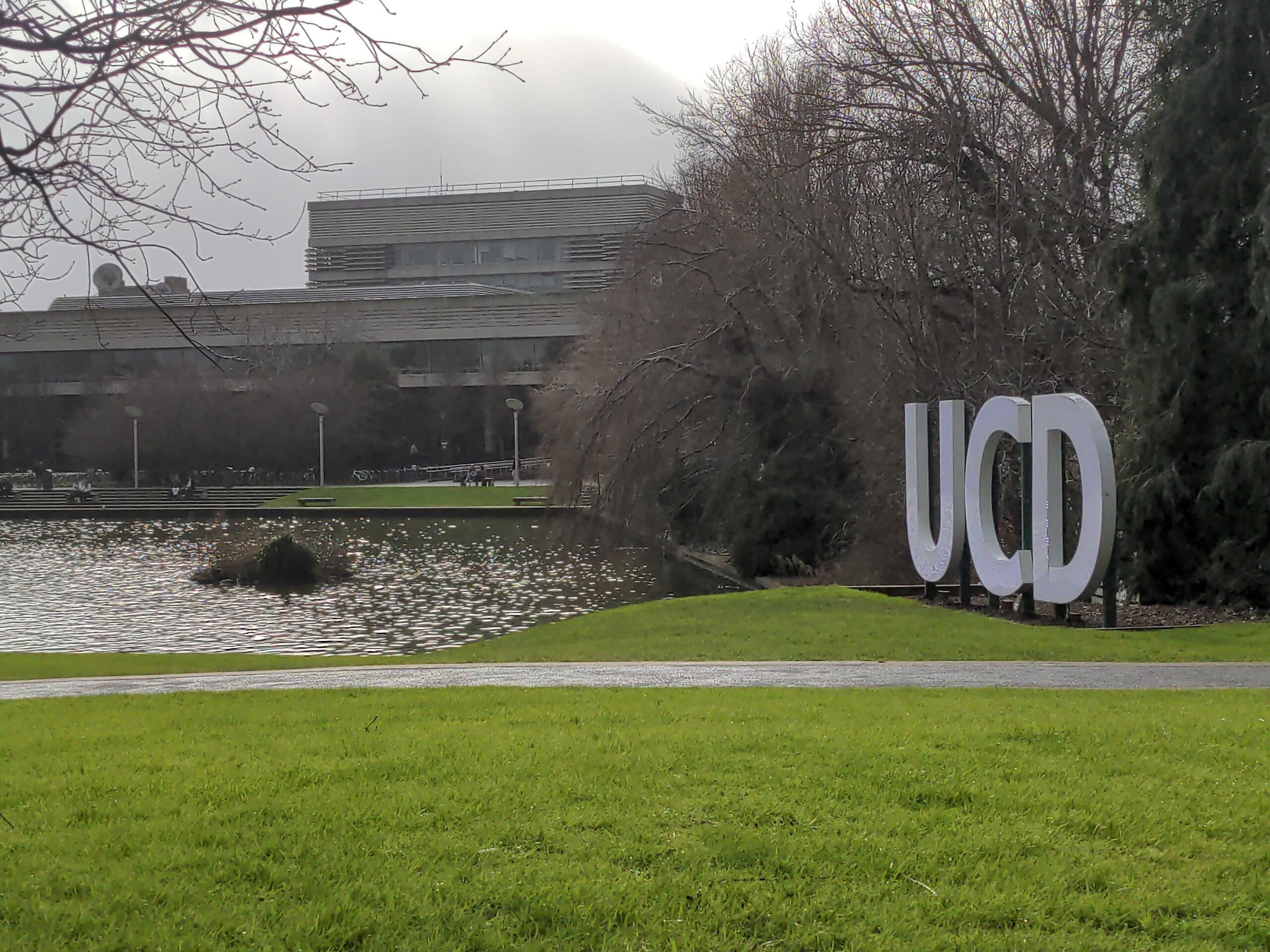

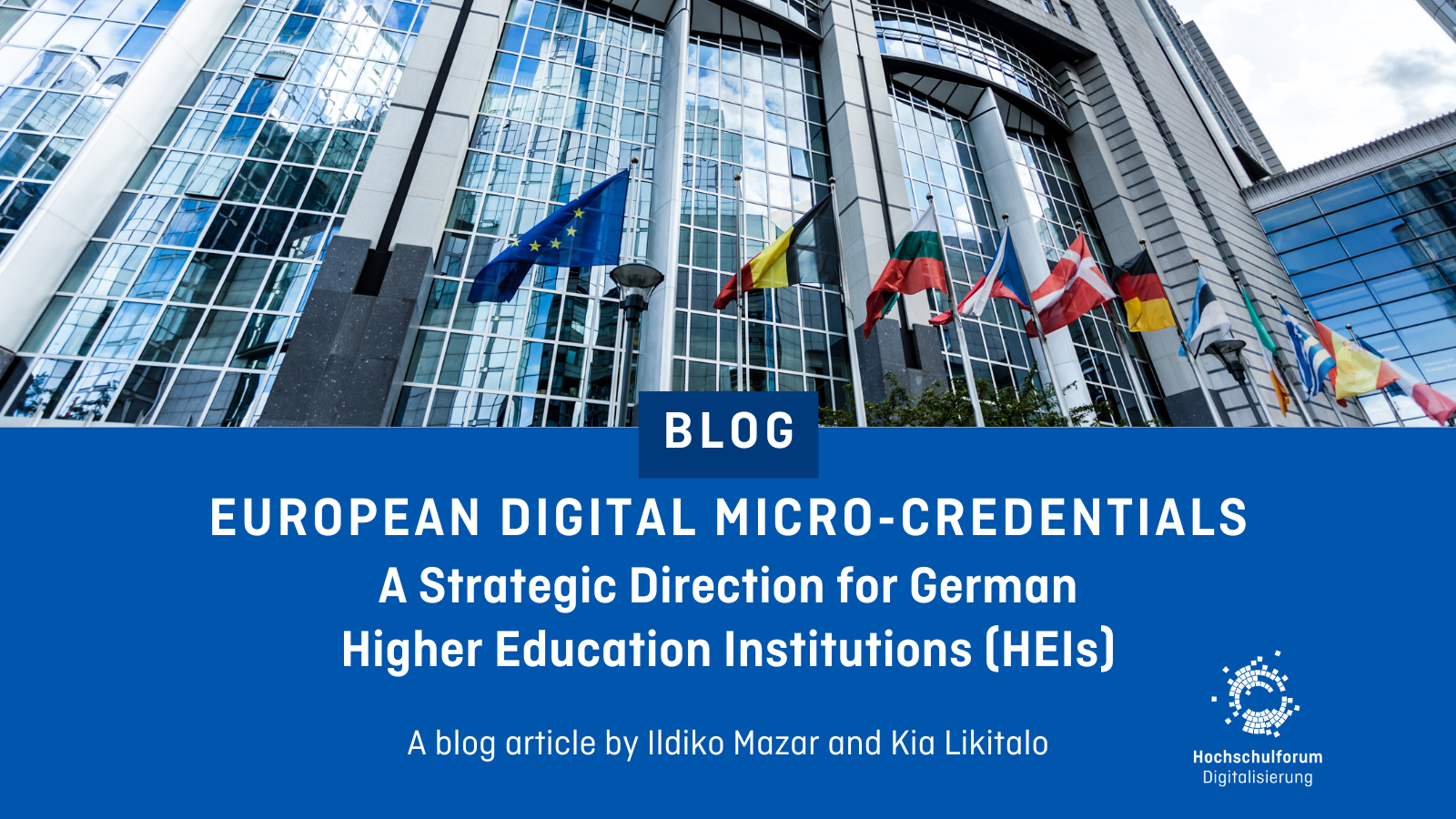

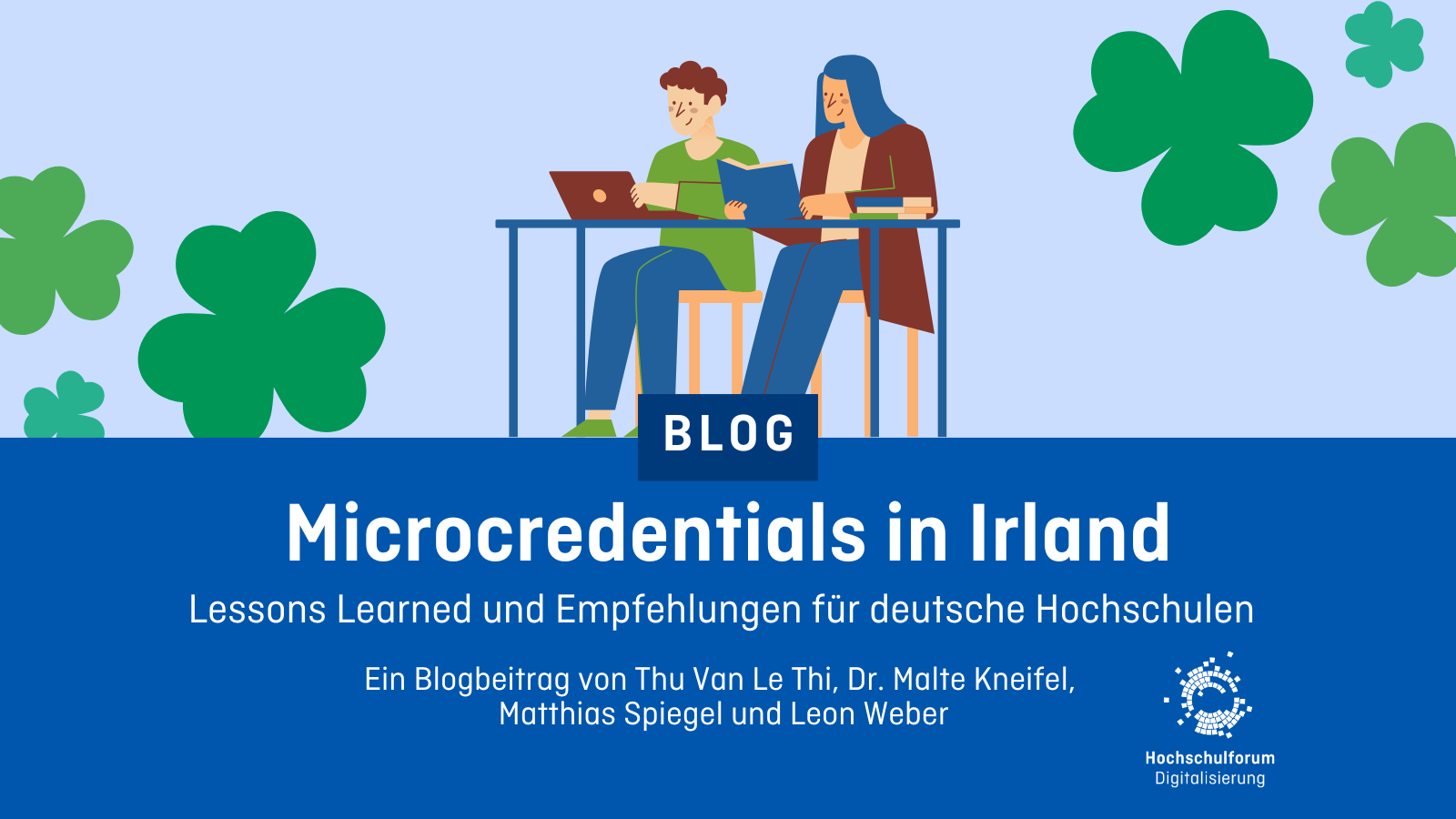
 Jan Plüer
Jan Plüer 
 Joana Eichhorn
Joana Eichhorn 